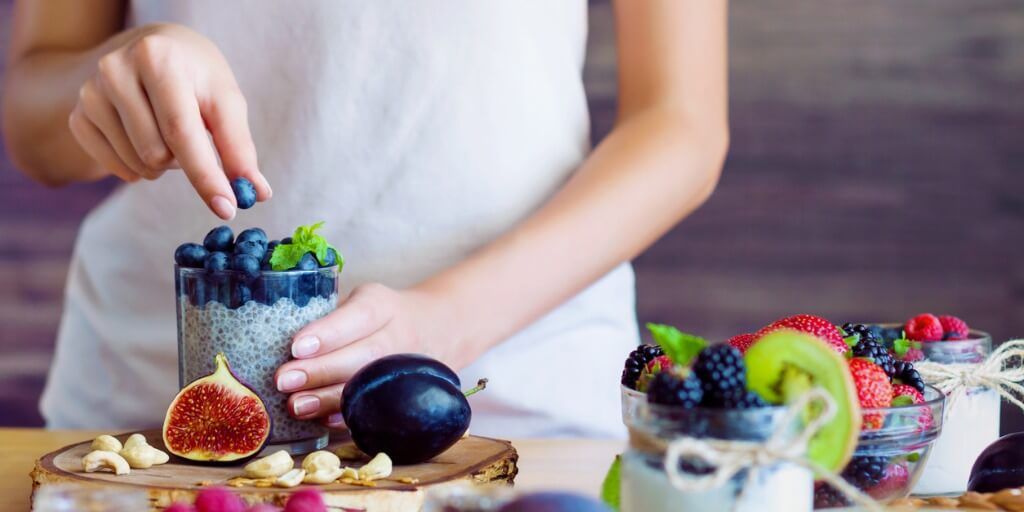Eating nutrient dense foods and staying away from options that increase inflammation helps reduce your risk of contracting an illness, including COVID-19. A good diet leads to a good immune system. Richmond health coach Lindsey Patton went live on Facebook this week to answer questions about how diet and nutrition can help you maximize your resilience to COVID-19. Watch the video and read the recap below.
Having trouble getting the video to play? Get troubleshooting tips here.)
- I'm on a smoothie kick for breakfast these days. What should I avoid? What should I include?
A great way to add nutrients to your smoothies is by adding vegetables like spinach or kale. It'll change the color of your smoothie, but not the taste. It's a great way to add a bulk of leafy green vegetables without having to chew them all, especially in the mornings. These vegetables are also high in Vitamin C, which boosts your immune system.
Also, think about adding protein powder to keep you full longer, so you avoid snacking on unhealthy foods. Also, add citrus for Vitamin C and berries, which low in carbs and high in antioxidants.
- Is there a diet "style" that's best for immunity? (paleo, Mediterranean, keto, vegan, etc.)
The most important thing is just to make sure you're getting plenty of protein and fiber. Your protein could come from meat, fish, eggs, dairy, etc. The best way to get fiber is from fresh veggies and fruits. If you're able to balance those things and avoid processed foods, you're doing well. Any of those specific diets, you can still follow the rules but eat bad foods. Be wary of foods that are in the center of the grocery store. Anything on a shelf has been processed in some way, often with sugar or salt added to preserve the shelf life.
- What are some simple things I can do to improve my diet on my next trip to the grocery store?
To boost your immunity, add citrus fruits, spinach, and red bell peppers to your next grocery cart. These are great sources for Vitamin C. If you're on a low-carb diet, get your Vitamin C from spinach. Citrus fruits are good for us, but they do have a little bit of sugar. Ginger and tumeric are other good things that can help boost your immune system. And lastly, greek yogurt is a great way to get protein and Vitamin D, which help reduce inflammation.
- I've switched to grain-free, dairy-free Paleo lately to reduce inflammation, but is any carb bad right now especially during COVID? For example, should I cut out even gluten-free rice noodles if I'm trying to maximize immunity and decrease inflammation as much as possible?
All carbs are not bad. They just aren't all created equal. If it comes in a box, it's likely tampered from its original form. Fruits and veggies are carbs, but are better than something coming out of a box. Stick to the perimeter of the grocery store.
- Is eating ghee instead of butter really eating dairy-free?
Ghee is just a clarified form of butter. You can make it yourself or buy it, but it's just heated up butter that separates the milk solids from the liquid. It's a good alternative for dairy-free or lactose intolerant people.
- How bad is it to eat close to bed time?
You want to give your body time to digest your food before going to bed. Ideally, wait 2-3 hours after eating dinner before going to bed to give your body enough time to digest your food and prepare for sleep.
- How do you know if the foods you have been eating have caused inflammation?
Great question. Inflammation can show up in a lot of ways. Redness of the skin and a bloated belly are signs of inflammation.
- Are there ways to eat turmeric outside of Indian food?
The two ways I incorporate turmeric are by adding it to a smoothie or by taking it as a capsule. If anyone has other ideas, feel free to leave a suggestion in the comments.
Strong Immunity September
You wear a mask, keep your distance, and wash your hands frequently. You are doing what you need to do to reduce your risk of contracting COVID-19. But what can you do to reduce your risk of having a bad outcome, think serious symptoms or hospitalization?
That's what we're focusing on this September. What strategies will help boost your immune system so it's best prepared to ward off COVID-19 (and any other illness)? Check out all of our content here.
